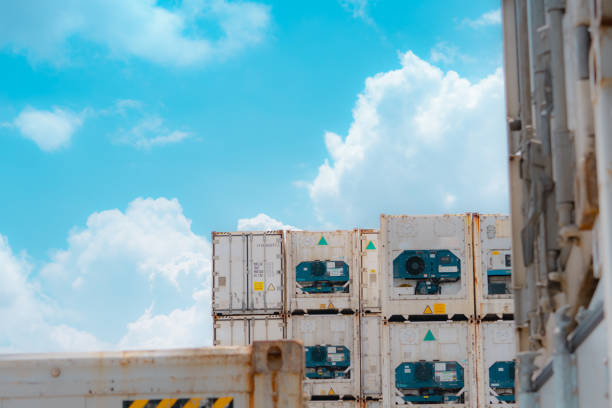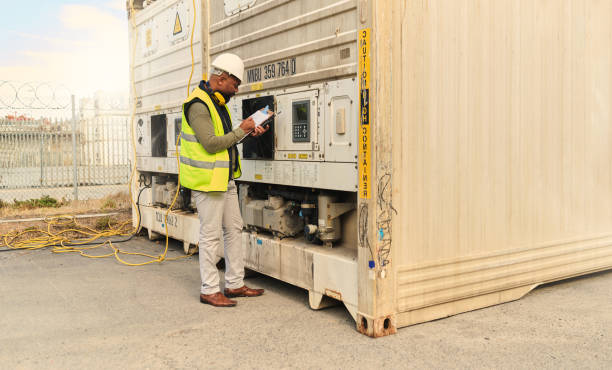Why Regular Maintenance Is Key For Refrigeration For Marine Vessels
Regular maintenance is essential for refrigeration for marine vessels, as it ensures systems remain reliable, efficient, and capable of withstanding the demanding marine environment. Refrigeration systems onboard vessels are critical for preserving perishable goods, ensuring crew comfort, and supporting the overall operation of the ship. Neglecting regular upkeep can lead to equipment failures, increased energy costs, and product losses, all of which can disrupt marine operations.
The unique conditions at sea, such as exposure to saltwater, temperature changes, and constant movement, make marine refrigeration systems more vulnerable to wear and tear compared to land-based units. Corrosion, leaks, and electrical failures are common issues that can arise without regular maintenance, putting both cargo and vessel operations at risk.
In this article, we at The Cold Management will explore why regular maintenance is key for refrigeration systems on marine vessels. We’ll discuss how the marine environment impacts these systems, the consequences of neglect, and the essential steps to maintain their efficiency. Additionally, we’ll highlight the cost-saving benefits of a well-maintained refrigeration system, from preventing expensive repairs to reducing energy consumption.
Whether you’re managing a fishing vessel, a cargo ship, or a luxury yacht, understanding the importance of regular maintenance can help you maximise your system’s lifespan and protect your investment. By the end of this guide, you’ll have the knowledge and practical tips needed to ensure your refrigeration system is always ready for the challenges of the sea.
How The Marine Environment Impacts Refrigeration Systems
The marine environment is one of the toughest settings for equipment, and refrigeration for marine vessels is no exception. These systems face unique challenges at sea that can affect their performance and lifespan. Here are the main ways the marine environment impacts refrigeration systems:
- Saltwater Corrosion: Constant exposure to saltwater and salty air leads to corrosion of metal components. Pipes, evaporators, and compressors are particularly vulnerable. Corrosion weakens these parts over time, resulting in leaks, reduced efficiency, and eventual system failure.
- High Humidity Levels: The sea’s humid conditions create moisture build-up within the refrigeration unit. This moisture can damage electrical components, encourage mould growth, and negatively impact the air quality within storage spaces. Excess humidity also increases the workload of the refrigeration system, reducing its efficiency.
- Temperature Variations: Marine vessels often travel across different climates, exposing refrigeration systems to fluctuating temperatures. These variations force the system to work harder to maintain consistent cooling, which can increase wear and tear on components like compressors and thermostats.
- Constant Vibrations and Movement: The motion of the sea causes vibrations that can loosen bolts, connections, and other mechanical parts of the refrigeration system. Over time, this leads to inefficiencies or breakdowns, especially if these minor issues aren’t addressed during maintenance.
- Limited Access to Repairs: When a refrigeration system fails at sea, immediate access to spare parts or professional repairs is limited. This makes preventive maintenance even more important, as a breakdown could result in spoiled goods, financial losses, and operational delays.
Why Understanding These Impacts Is Important:
By recognising how the marine environment affects refrigeration systems, vessel operators can take proactive measures to reduce the impact. Regular maintenance, corrosion-resistant materials, and robust system designs are key to ensuring reliable performance.
Maintaining refrigeration systems is not just about keeping them operational; it’s about preventing these environmental factors from escalating into costly problems. Addressing these challenges with routine checks and proper care ensures that refrigeration systems remain dependable, no matter the conditions at sea. This proactive approach helps protect both the cargo and the overall functionality of the vessel.

Common Problems Without Regular Maintenance For Refrigeration Systems
Without routine upkeep, refrigeration for marine vessels can develop a range of problems that compromise their efficiency and reliability. Here are some of the most common issues that arise when regular maintenance is neglected:
- Refrigerant Leaks: Over time, wear and tear can lead to refrigerant leaks, which reduce the system’s ability to cool effectively. Low refrigerant levels force the compressor to work harder, leading to higher energy consumption and potential damage to the system.
- Dirty or Blocked Coils: Condenser and evaporator coils can accumulate dust, salt, and grime, particularly in a marine setting. This build-up reduces heat exchange efficiency, causing the system to overheat and underperform.
- Electrical Failures: The high humidity and salt exposure in marine environments can corrode electrical components, leading to short circuits or complete system failures. Faulty wiring or damaged control panels can prevent the refrigeration unit from functioning altogether.
- Compressor Overload: The compressor is the heart of a refrigeration system, and overuse due to poor maintenance can cause it to overheat or fail. Replacing a compressor is costly, making preventive care essential to avoid such a scenario.
- Uneven Cooling: A poorly maintained system may struggle to distribute cold air evenly, leading to inconsistent temperatures within storage areas. This can cause spoilage or degradation of perishable goods, resulting in financial losses.
- Increased Energy Bills: When a refrigeration system isn’t running efficiently, it consumes more power to achieve the desired cooling. This leads to higher energy costs and increased strain on the vessel’s power supply.
The Risks of Neglecting Maintenance:
- Cargo Spoilage: Perishable goods, such as seafood or pharmaceuticals, can spoil quickly without proper cooling, resulting in significant financial losses.
- Operational Downtime: A failed refrigeration system can cause delays in shipping schedules and disrupt the vessel’s operations.
- Costly Emergency Repairs: Addressing a breakdown at sea is not only expensive but also challenging due to limited access to spare parts and technicians.
By prioritising regular maintenance, these common problems can be prevented. A well-maintained refrigeration system ensures reliable performance, protects valuable cargo, and avoids the stress of unexpected failures during a voyage.
Steps To Maintain Refrigeration For Marine Vessels
Proper maintenance is the key to ensuring the refrigeration in marine vessels operates efficiently and reliably. A well-maintained system minimises the risk of breakdowns, reduces energy costs, and extends the lifespan of the equipment. Here are the essential steps to maintain your marine refrigeration system:
- Regularly Inspect Refrigerant Levels: Refrigerant is essential for the cooling process. Low levels can reduce cooling capacity and put extra strain on the compressor. Have a professional check refrigerant levels regularly to ensure they are within the recommended range and address any leaks immediately.
- Clean Condenser and Evaporator Coils: Over time, coils accumulate dust, salt, and other debris, especially in marine environments. Dirty coils reduce heat exchange efficiency, forcing the system to work harder. Cleaning the coils during routine maintenance ensures optimal performance.
- Replace or Clean Air Filters: Air filters help maintain good airflow and prevent debris from entering the system. Dirty or clogged filters can block airflow, making the system less efficient. Replace or clean filters regularly to keep the system running smoothly.
- Inspect for Leaks and Corrosion: Regularly check pipes, seals, and joints for signs of refrigerant or water leaks. Look for corrosion caused by exposure to saltwater, which can weaken components and cause failures. Addressing these issues early prevents larger problems.
- Check Electrical Components: Inspect wiring, switches, and circuits for any damage or corrosion caused by the marine environment. Faulty electrical components can cause system malfunctions or failures, so replacing worn parts promptly is essential.
- Test Thermostats and Controls: Ensure that the system’s thermostats and controls are functioning properly to maintain consistent temperatures. Faulty controls can lead to uneven cooling or overworking of the system.
- Lubricate Moving Parts: Parts like motors and fans require regular lubrication to reduce friction and prevent wear and tear. Proper lubrication helps keep these components running smoothly.
- Schedule Professional Inspections: While onboard checks are helpful, professional servicing at least twice a year ensures a thorough assessment of the system. Technicians can identify hidden issues and perform advanced maintenance.
By following these maintenance steps, you can keep your marine refrigeration system in excellent condition, ensuring it operates efficiently and reliably even in challenging environments. Regular maintenance protects your investment and ensures smooth operations at sea.

Cost-Saving Benefits Of Regular Maintenance For Refrigeration Systems
Investing in regular maintenance for refrigeration for marine vessels is not only essential for reliable operations but also a smart financial decision. Here are the key cost-saving benefits of routine upkeep:
1. Prevention of Costly Repairs: Neglecting maintenance often leads to breakdowns that require expensive emergency repairs. For example, a refrigerant leak left unchecked can damage the compressor, resulting in a costly replacement. Routine inspections help identify small issues before they escalate into major problems, saving you from unexpected repair bills.
2. Lower Energy Bills: A well-maintained refrigeration system operates at peak efficiency, using less energy to maintain the desired temperature. Blocked coils, clogged filters, or refrigerant issues force the system to work harder, increasing energy consumption. By keeping these components clean and functioning properly, you reduce energy costs and lessen the strain on the vessel’s power supply.
3. Extended Equipment Lifespan: Routine servicing reduces wear and tear on critical components, ensuring your refrigeration system lasts longer. Replacing a refrigeration unit is a significant investment, so extending its lifespan through regular maintenance helps delay costly replacements.
4. Minimised Cargo Loss: For vessels carrying perishable goods like seafood, dairy, or pharmaceuticals, refrigeration failures can lead to spoiled cargo and financial losses. Regular maintenance ensures the system runs reliably, protecting your valuable cargo and maintaining the quality of your shipments.
5. Avoidance of Emergency Costs: Breakdowns at sea often come with additional costs, such as emergency technician visits, towing fees, or expedited shipping for replacement parts. Regular maintenance reduces the likelihood of such incidents, saving money and preventing operational delays.
6. Improved Efficiency Equals Higher Profitability: Efficient systems not only reduce operational costs but also allow vessels to maintain schedules and avoid downtime. A well-maintained refrigeration system contributes to overall efficiency, supporting the profitability of marine operations.
The Bigger Picture:
Investing in maintenance is not an expense—it’s an investment in your vessel’s reliability and financial health. By ensuring your refrigeration system operates smoothly, you save money in the short term through reduced energy bills and in the long term by avoiding costly replacements and repairs. Regular maintenance keeps your operations running without unnecessary disruptions.
Keep Your Refrigeration System Shipshape!
Maintaining refrigeration for marine vessels is not just a routine task; it’s an essential step in ensuring smooth operations, protecting valuable cargo, and avoiding unnecessary costs. Regular maintenance helps you stay ahead of potential issues, keeping your refrigeration system efficient, reliable, and ready for the challenges of the marine environment.
The benefits of regular maintenance are clear—lower energy costs, fewer repairs, and longer system lifespan. It also reduces the risk of operational delays and cargo spoilage, which can have significant financial and reputational impacts. By following a consistent maintenance schedule and addressing minor issues early, you ensure that your refrigeration system performs at its best, no matter the conditions at sea.
At The Cold Management Refrigeration & Air Conditioning, we understand the unique demands of marine refrigeration systems. Our experienced team is here to provide expert servicing, repair, and maintenance to keep your system running smoothly. We offer tailored solutions designed to meet the specific needs of your vessel, ensuring reliable performance and peace of mind during every voyage.
Don’t let refrigeration problems disrupt your marine operations. Trust us to help you maintain a high-performing system that supports your business and protects your cargo. Ready to schedule your next maintenance? Contact us today at 07496 399738 or email us at service@tcmrefrigeration.co.uk. Let’s keep your refrigeration system shipshape and your operations seamless!
Share This Story, Choose Your Platform!
About The Cold Management Refrigeration





